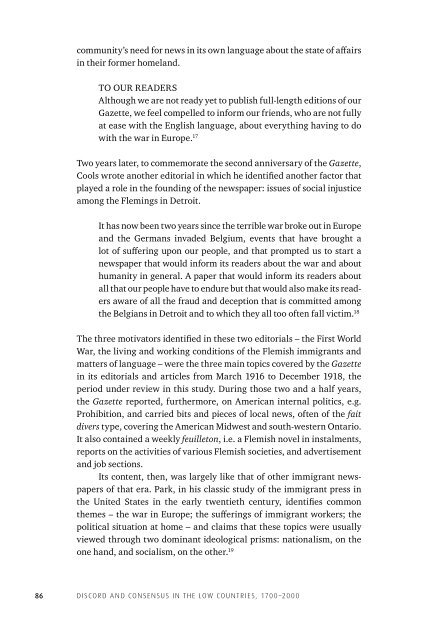Discord Consensus
7aze300jFJo
7aze300jFJo
Create successful ePaper yourself
Turn your PDF publications into a flip-book with our unique Google optimized e-Paper software.
community’s need for news in its own language about the state of affairs<br />
in their former homeland.<br />
TO OUR READERS<br />
Although we are not ready yet to publish full-length editions of our<br />
Gazette, we feel compelled to inform our friends, who are not fully<br />
at ease with the English language, about everything having to do<br />
with the war in Europe. 17<br />
Two years later, to commemorate the second anniversary of the Gazette,<br />
Cools wrote another editorial in which he identified another factor that<br />
played a role in the founding of the newspaper: issues of social injustice<br />
among the Flemings in Detroit.<br />
It has now been two years since the terrible war broke out in Europe<br />
and the Germans invaded Belgium, events that have brought a<br />
lot of suffering upon our people, and that prompted us to start a<br />
newspaper that would inform its readers about the war and about<br />
humanity in general. A paper that would inform its readers about<br />
all that our people have to endure but that would also make its readers<br />
aware of all the fraud and deception that is committed among<br />
the Belgians in Detroit and to which they all too often fall victim. 18<br />
The three motivators identified in these two editorials –the First World<br />
War, the living and working conditions of the Flemish immigrants and<br />
matters of language –were the three main topics covered by the Gazette<br />
in its editorials and articles from March 1916 to December 1918, the<br />
period under review in this study. During those two and a half years,<br />
the Gazette reported, furthermore, on American internal politics, e.g.<br />
Prohibition, and carried bits and pieces of local news, often of the fait<br />
divers type, covering the American Midwest and south-western Ontario.<br />
It also contained a weekly feuilleton, i.e. a Flemish novel in instalments,<br />
reports on the activities of various Flemish societies, and advertisement<br />
and job sections.<br />
Its content, then, was largely like that of other immigrant newspapers<br />
of that era. Park, in his classic study of the immigrant press in<br />
the United States in the early twentieth century, identifies common<br />
themes – the war in Europe; the sufferings of immigrant workers; the<br />
political situation at home – and claims that these topics were usually<br />
viewed through two dominant ideological prisms: nationalism, on the<br />
one hand, and socialism, on the other. 19<br />
86<br />
DISCORD AND CONSENSUS IN THE LOW COUNTRIES, 1700–2000


